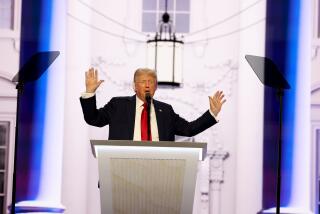The Washington Summit : Gorbachev and U.S. Conservatives : The Reagan Message Aims at 2 Audiences
WASHINGTON — In a carefully staged performance during this summit week, President Reagan is paying nearly as much attention to the concerns of conservatives in the Senate and the unseen television audience as he is to Mikhail S. Gorbachev and others with whom he is speaking directly.
Using a combination of humor and firm language, Reagan took care Tuesday to make clear in his public pronouncements that he will give no ground to the Soviet Union--even as the Soviet leader delivered low-key, unprovocative remarks as the two shared a podium on the South Lawn of the White House.
“Like the peoples of your country, we believe our country should be strong, but we desire peace. Have no doubt about that: The longing for peace runs deep here, second only to our fervency for the preservation of our liberty,” Reagan said at the ceremony in which he welcomed Gorbachev to the United States.
Such remarks, one senior White House official said, were not inserted specifically to warn Gorbachev that Reagan would follow a tough line in their private talks. Nor were they intended to send such a signal to senators who oppose ratification of the medium-range missile treaty that the two leaders signed in the afternoon.
‘It Doesn’t Hurt’
“On the other hand, it doesn’t hurt,” this official said, speaking on the condition of anonymity. “It’s useful for him to say it. It’s a message to the whole world. It’s a way to avoid summit euphoria” that could raise false hopes.
“It’s true the President is very cognizant of the fact that in terms of the treaty ratification and in the larger context, he has to let people know he’s realistic about the environment in which we find ourselves--that we can’t be carried away by the historic significance of the moment, that he’s talking the long-term view and that includes serious differences,” another senior White House official said.
In nearly every public comment over the last two days, Reagan has woven into his remarks a reference to his wariness about signing a treaty that does not contain sufficient verification provisions to guarantee adherence by both sides.
Indeed, his use of a Soviet maxim in most of his recent speeches about arms control--”trust, but verify”--prompted this exchange with Gorbachev in the midst of his formal, prepared remarks moments before the treaty was signed:
Gorbachev: “You repeat that at every meeting.”
Reagan: “I like it.”
The Audience Laughed
Both men smiled as Soviet and U.S. officials in the audience laughed.
The off-the-cuff remarks were perfect for the White House staff’s attempt to apply a tinge of humor to its portrait of a relaxed President confident in his dealings with the visiting Soviet leader.
One crack, delivered in an ad-libbed fashion, was even written into the President’s treaty-signing remarks, the White House official said.
In that instance, Reagan said his initial suggestion, which was eventually transformed into the arms control treaty that he and Gorbachev signed, was “a simple proposal--one might say, disarmingly simple.” The line brought the desired degree of levity to an otherwise painfully formal occasion.
Even in a meeting with the Joint Chiefs of Staff on Monday, in preparation for Gorbachev’s visit, Reagan--talking to reporters during a photo session at the start of the conference--was playing to an audience well beyond the White House Roosevelt Room.
With an implied nod to conservative opponents, Reagan said he wanted a long-range, strategic arms reduction agreement, “but only if it’s a good one, one we can verify and which enhances our security.”
Candid Views of Service Chiefs
And, as if to tell critics directly that the Pentagon supports the intermediate-range treaty, Reagan said in reference to the Joint Chiefs of Staff: “It’s only because I know that I can get the candid views of America’s military leaders that I can have confidence in the wisdom of going forward with this agreement.”
Sen. Alan Cranston (D-Calif.) said in a telephone interview that Reagan’s frequent references to domestic political concerns at such diplomatic occasions as the treaty-signing ceremony or the lavish welcome given Gorbachev on the White House grounds should be no surprise to the Soviet leader, who is also sensitive to domestic political concerns back home.
In referring to Reagan’s mention of differences over human rights issues and regional conflicts--code words that cover Afghanistan, the Persian Gulf and Nicaragua--Cranston remarked: “He already said he’d discuss those things. He was showing he’d do it by saying it publicly.”
Appropriate Comment
“What Reagan said was appropriate in terms of moving the treaty along in the Senate and placating the opponents,” the senator said.
At the same time, he said Gorbachev, who avoided nearly any hint of controversy, had also tailored his remarks to the American audience, “speaking in ways that would be appealing” in this nation.
“On behalf of the Soviet people, I declare that we are prepared to go all the way along our part of the road with the sincerity and responsibility that befit a great and peaceful power,” Gorbachev said.
More to Read
Sign up for Essential California
The most important California stories and recommendations in your inbox every morning.
You may occasionally receive promotional content from the Los Angeles Times.









